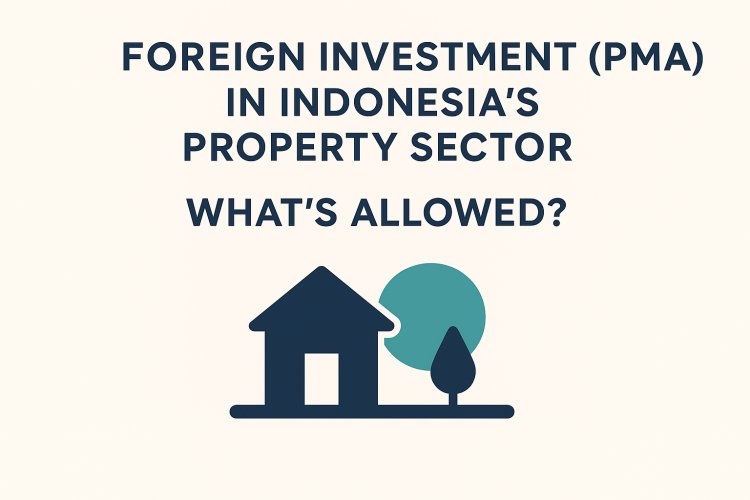Foreign Investment (PMA) in Indonesia’s Property Sector: What’s Allowed?
Discover what types of property ownership are allowed for foreign investors (PMA) in Indonesia, including legal structures, land rights, and compliance tips.

Why Foreigners Invest in Indonesian Property
Indonesia remains one of the most attractive destinations for property investment in Southeast Asia, particularly in Bali, Jakarta, and Lombok.
However, foreign ownership of property in Indonesia is tightly regulated. The law differentiates between property owned directly by individuals and property owned through a foreign investment company (PT PMA).
Can a PT PMA Own Property in Indonesia?
Yes , but with certain legal restrictions.
A PT PMA (Foreign-Owned Company) is allowed to hold property rights in the following forms:
-
Right to Build (Hak Guna Bangunan / HGB): Allows a company to build on state land for up to 30 years, extendable.
-
Right to Use (Hak Pakai / HP): Grants the right to use state or private land for a specific purpose and duration.
-
Leasehold Rights: Allows use of land or buildings based on a private lease agreement but does not grant ownership.
Foreign companies cannot own Freehold Title (Hak Milik) — this right is strictly limited to Indonesian citizens and fully local legal entities.
Common Legal Structures for Property Investment
Foreign investors typically use several legal structures to operate in Indonesia’s property sector:
-
Establishing a PT PMA in the property or accommodation business sector.
Example: A company operating in villa management, hotel, or real estate development under OSS RBA licensing. -
Nominee Ownership (through a local individual).
⚠️ Not recommended. This structure is illegal and highly risky — nominee arrangements are not recognized under Indonesian land law. -
Legitimate contractual arrangements such as leasehold, joint venture, or build-operate-transfer (BOT) models.
For full compliance and investor protection, option 1 and 3 are the most legally sound.
Business Sectors Open to Foreign Investment (PMA)
According to Presidential Regulation No. 49 of 2021 on the Investment Priority List, foreign investors may participate in several property-related sectors, including:
-
Real Estate Development (KBLI 68111, 68112)
-
Property Leasing and Management (KBLI 68200)
-
Hotels, Resorts, Villas, and Accommodation (KBLI 55110, 55120, etc.)
Each sector requires a minimum investment of IDR 10 billion per project (excluding land and buildings), along with mandatory permits such as NIB (Business Identification Number), location permits, and environmental approvals (AMDAL/UKL-UPL).
Legal and Compliance Risks to Watch Out For
Before entering the market, foreign investors should be aware of several common risks:
-
Use of illegal nominee structures, which can result in loss of property rights.
-
Zoning restrictions — many attractive areas are in non-commercial or green zones under local spatial plans (RDTR).
-
Lack of appropriate business licensing (OSS RBA) for property-related activities.
-
Poorly drafted or non-compliant joint venture or lease agreements.
A thorough legal due diligence should always be conducted before purchasing land, entering a lease, or forming a company.
Conclusion
Foreign investors can legally invest in property in Indonesia through a properly established PT PMA or a compliant contractual structure.
With the right legal guidance and due diligence, it’s possible to invest confidently and build a sustainable property portfolio in Indonesia , from Bali villas to commercial developments.
Contact Us
If you’re planning to buy land, develop a villa, or enter the Indonesian property market, contact our legal team.
We assist with due diligence, company establishment (PT PMA), and legal structuring to ensure your investment is secure and compliant.
What's Your Reaction?













